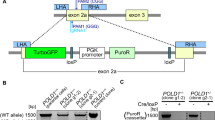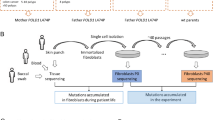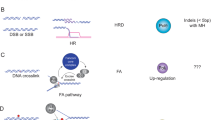Abstract
Mutations in the POLD1 and POLE genes encoding DNA polymerases δ (Polδ) and ɛ (Polɛ) cause hereditary colorectal cancer (CRC) and have been found in many sporadic colorectal and endometrial tumors. Much attention has been focused on POLE exonuclease domain mutations, which occur frequently in hypermutated DNA mismatch repair (MMR)-proficient tumors and appear to be responsible for the bulk of genomic instability in these tumors. In contrast, somatic POLD1 mutations are seen less frequently and typically occur in MMR-deficient tumors. Their functional significance is often unclear. Here we demonstrate that expression of the cancer-associated POLD1-R689W allele is strongly mutagenic in human cells. The mutation rate increased synergistically when the POLD1-R689W expression was combined with a MMR defect, indicating that the mutator effect of POLD1-R689W results from a high rate of replication errors. Purified human Polδ-R689W has normal exonuclease activity, but the nucleotide selectivity of the enzyme is severely impaired, providing a mechanistic explanation for the increased mutation rate in the POLD1-R689W-expressing cells. The vast majority of mutations induced by the POLD1-R689W are GC→TA transversions and GC→AT transitions, with transversions showing a strong strand bias and a remarkable preference for polypurine/polypyrimidine sequences. The mutational specificity of the Polδ variant matches that of the hypermutated CRC cell line, HCT15, in which this variant was first identified. The results provide compelling evidence for the pathogenic role of the POLD1-R689W mutation in the development of the human tumor and emphasize the need to experimentally determine the significance of Polδ variants present in sporadic tumors.
This is a preview of subscription content, access via your institution
Access options
Subscribe to this journal
Receive 50 print issues and online access
$259.00 per year
only $5.18 per issue
Buy this article
- Purchase on Springer Link
- Instant access to full article PDF
Prices may be subject to local taxes which are calculated during checkout




Similar content being viewed by others
References
Preston BD, Albertson TM, Herr AJ . DNA replication fidelity and cancer. Semin Cancer Biology 2010; 20: 281–293.
Lynch HT, de la Chapelle A . Hereditary colorectal cancer. N Engl J Med 2003; 348: 919–932.
Peltomäki P, Vasen H . Mutations associated with HNPCC predisposition–Update of ICG-HNPCC/INSiGHT mutation database. Dis Markers 2004; 20: 269–276.
Imai K, Yamamoto H . Carcinogenesis and microsatellite instability: the interrelationship between genetics and epigenetics. Carcinogenesis 2008; 29: 673–680.
Palles C, Cazier JB, Howarth KM, Domingo E, Jones AM, Broderick P et al. Germline mutations affecting the proofreading domains of POLE and POLD1 predispose to colorectal adenomas and carcinomas. Nat Genet 2013; 45: 136–144.
Valle L, Hernández-Illán E, Bellido F, Aiza G, Castillejo A, Castillejo M-I et al. New insights into POLE and POLD1 germline mutations in familial colorectal cancer and polyposis. Hum Mol Genet 2014; 23: 3506–3512.
Church DN, Briggs SE, Palles C, Domingo E, Kearsey SJ, Grimes JM et al. DNA polymerase ɛ and δ exonuclease domain mutations in endometrial cancer. Hum Mol Genet 2013; 22: 2820–2828.
Cancer Genome Atlas Network. Comprehensive molecular characterization of human colon and rectal cancer. Nature 2012; 487: 330–337.
Seshagiri S, Stawiski EW, Durinck S, Modrusan Z, Storm EE, Conboy CB et al. Recurrent R-spondin fusions in colon cancer. Nature 2012; 488: 660–664.
Cancer Genome Atlas Research Network. Integrated genomic characterization of endometrial carcinoma. Nature 2013; 497: 67–73.
Shinbrot E, Henninger EE, Weinhold N, Covington KR, Goksenin AY, Schultz N et al. Exonuclease mutations in DNA polymerase epsilon reveal replication strand specific mutation patterns and human origins of replication. Genome Res 2014; 24: 1740–1750.
Kane DP, Shcherbakova PV . A common cancer-associated DNA polymerase ɛ mutation causes an exceptionally strong mutator phenotype, indicating fidelity defects distinct from loss of proofreading. Cancer Res 2014; 74: 1895–1901.
Briggs S, Tomlinson I . Germline and somatic polymerase ɛ and δ mutations define a new class of hypermutated colorectal and endometrial cancers. J Pathol 2013; 230: 148–153.
Seshagiri S . The burden of faulty proofreading in colon cancer. Nat Genet 2013; 45: 121–122.
Giannakis M, Mu XJ, Shukla SA, Qian ZR, Cohen O, Nishihara R et al. Genomic correlates of immune-cell infiltrates in colorectal carcinoma. Cell Rep 2016; 17: 1206.
Wong A, Kuick CH, Wong WL, Tham JM, Mansor S, Loh E et al. Mutation spectrum of POLE and POLD1 mutations in South East Asian women presenting with grade 3 endometrioid endometrial carcinomas. Gynecol Oncol 2016; 141: 113–120.
Daee DL, Mertz TM, Shcherbakova PV . A cancer-associated DNA polymerase δ variant modeled in yeast causes a catastrophic increase in genomic instability. Proc Natl Acad Sci USA 2010; 107: 157–162.
Abaan OD, Polley EC, Davis SR, Zhu YJ, Bilke S, Walker RL et al. The exomes of the NCI-60 panel: a genomic resource for cancer biology and systems pharmacology. Cancer Res 2013; 73: 4372–4382.
Flohr T, Dai JC, Buttner J, Popanda O, Hagmuller E, Thielmann HW . Detection of mutations in the DNA polymerase δ gene of human sporadic colorectal cancers and colon cancer cell lines. Int J Cancer 1999; 80: 919–929.
Tibbetts LM, Chu MY, Hager JC, Dexter DL, Calabresi P . Chemotherapy of cell-line-derived human colon carcinomas in mice immunosuppressed with antithymocyte serum. Cancer 1977; 40: 2651–2659.
Mouradov D, Sloggett C, Jorissen RN, Love CG, Li S, Burgess AW et al. Colorectal cancer cell lines are representative models of the main molecular subtypes of primary cancer. Cancer Res 2014; 74: 3238–3247.
Agbor AA, Göksenin AY, LeCompte KG, Hans SH, Pursell ZF . Human Pol ɛ-dependent replication errors and the influence of mismatch repair on their correction. DNA Repair 2013; 12: 954–963.
Glaab WE, Tindall KR . Mutation rate at the hprt locus in human cancer cell lines with specific mismatch repair-gene defects. Carcinogenesis 1997; 18: 1–8.
Ohzeki S, Tachibana A, Tatsumi K, Kato T . Spectra of spontaneous mutations at the hprt locus in colorectal carcinoma cell lines defective in mismatch repair. Carcinogenesis 1997; 18: 1127–1133.
Koi M, Umar A, Chauhan DP, Cherian SP, Carethers JM, Kunkel TA et al. Human chromosome 3 corrects mismatch repair deficiency and microsatellite instability and reduces N-methyl-N'-nitro-N-nitrosoguanidine tolerance in colon tumor cells with homozygous hMLH1 mutation. Cancer Res 1994; 54: 4308–4312.
Keohavong P, Xi L, Grant SG . Molecular analysis of mutations in the human HPRT gene. Methods Mol Biol 2005; 291: 161–170.
Herr AJ, Ogawa M, Lawrence NA, Williams LN, Eggington JM, Singh M et al. Mutator suppression and escape from replication error-induced extinction in yeast. PLoS Genet 2011; 7: e1002282.
Mertz TM, Sharma S, Chabes A, Shcherbakova PV . Colon cancer-associated mutator DNA polymerase δ variant causes expansion of dNTP pools increasing its own infidelity. Proc Natl Acad Sci USA 2015; 112: E2467–E2476.
Li L, Murphy KM, Kanevets U, Reha-Krantz LJ . Sensitivity to phosphonoacetic acid: a new phenotype to probe DNA polymerase δ in Saccharomyces cerevisiae. Genetics 2005; 170: 569–580.
Nick McElhinny SA, Stith CM, Burgers PM, Kunkel TA . Inefficient proofreading and biased error rates during inaccurate DNA synthesis by a mutant derivative of Saccharomyces cerevisiae DNA polymerase δ. J Biol Chem 2007; 282: 2324–2332.
Venkatesan RN, Hsu JJ, Lawrence NA, Preston BD, Loeb LA . Mutator phenotypes caused by substitution at a conserved motif A residue in eukaryotic DNA polymerase δ. J Biol Chem 2006; 281: 4486–4494.
Shlien A, Campbell BB, de Borja R, Alexandrov LB, Merico D, Wedge D et al. Combined hereditary and somatic mutations of replication error repair genes result in rapid onset of ultra-hypermutated cancers. Nat Genet 2015; 47: 257–262.
Ghodgaonkar MM, Kehl P, Ventura I, Hu L, Bignami M, Jiricny J . Phenotypic characterization of missense polymerase-δ mutations using an inducible protein-replacement system. Nat Commun 2014; 5: 4990.
Yoshida R, Miyashita K, Inoue M, Shimamoto A, Yan Z, Egashira A et al. Concurrent genetic alterations in DNA polymerase proofreading and mismatch repair in human colorectal cancer. Eur J Hum Genet 2011; 19: 320–325.
Shcherbakova PV, Pavlov YI . Mutagenic specificity of the base analog 6-N-hydroxylaminopurine in the URA3 gene of the yeast Saccharomyces cerevisiae. Mutagenesis 1993; 8: 417–421.
Masuda Y, Suzuki M, Piao J, Gu Y, Tsurimoto T, Kamiya K . Dynamics of human replication factors in the elongation phase of DNA replication. Nucleic Acids Res 2007; 35: 6904–6916.
Liu XQ, Rajput A, Geng L, Ongchin M, Chaudhuri A, Wang J . Restoration of transforming growth factor-β receptor II expression in colon cancer cells with microsatellite instability increases metastatic potential in vivo. J Biol Chem 2011; 286: 16082–16090.
Acknowledgements
We thank Rob Lewis and Mike Brattain for cell lines, and Elizabeth Moore and Krista Brown for technical assistance. This work was supported by the National Institutes of Health grants ES015869 to PVS, GM101167 to THT and CA140988 to JW and by Nebraska Department of Health and Human Services grants LB506 to PVS and THT. TMM was supported by a University of Nebraska Medical Center Graduate Studies Research Fellowship and by the Cancer Biology Training Grant T32CA009476 from the National Cancer Institute.
Author information
Authors and Affiliations
Corresponding author
Ethics declarations
Competing interests
The authors declare no conflict of interest.
Additional information
Supplementary Information accompanies this paper on the Oncogene website
Rights and permissions
About this article
Cite this article
Mertz, T., Baranovskiy, A., Wang, J. et al. Nucleotide selectivity defect and mutator phenotype conferred by a colon cancer-associated DNA polymerase δ mutation in human cells. Oncogene 36, 4427–4433 (2017). https://doi.org/10.1038/onc.2017.22
Received:
Revised:
Accepted:
Published:
Issue Date:
DOI: https://doi.org/10.1038/onc.2017.22
This article is cited by
-
Candidate variants in DNA replication and repair genes in early-onset renal cell carcinoma patients referred for germline testing
BMC Genomics (2023)
-
Signification and Application of Mutator and Antimutator Phenotype-Induced Genetic Variations in Evolutionary Adaptation and Cancer Therapeutics
Journal of Microbiology (2023)
-
POLE, POLD1, and NTHL1: the last but not the least hereditary cancer-predisposing genes
Oncogene (2021)
-
The POLD1R689W variant increases the sensitivity of colorectal cancer cells to ATR and CHK1 inhibitors
Scientific Reports (2020)



